#Nigerian Schoolchildren Kidnapped
Text
Show Up, Take Photos
The Meghans are global frauds. Every "good" deed, Every word & Every dollar is a GRIFT. "Nigerian girls & women" my arse.💔
Do they really expect us to believe that a global games event could ever be hosted by a country that repeatedly loses track of women & children? Harry and Meghan have the lowest of low in IQs but the rest of the world can see that THIS poverty tourism trip is yet another SUSSEX SCAM.
No country will send disabled athletes or veterans to compete in a country that cannot keep track of school kids. Shame on Nigeria's Defense Minister and all at Invictus who are involved in this fraudulent visit.
"Bring Back our Girls 2.0
"The abduction of the 287 children in Kaduna state on March 7, 2024 near the West African nation’s capital, is one of the largest school kidnappings in the decade since the kidnapping of schoolgirls in Borno state’s Chibok village in 2014 stunned the world. Analysts and activists say the security lapses that allowed that mass abduction remain..."
"One man was shot dead as he tried to save the students, school authorities said"
"The parallels between the two kidnappings have created more worry for parents, as even to this day nearly 100 of the Chibok girls remain missing."
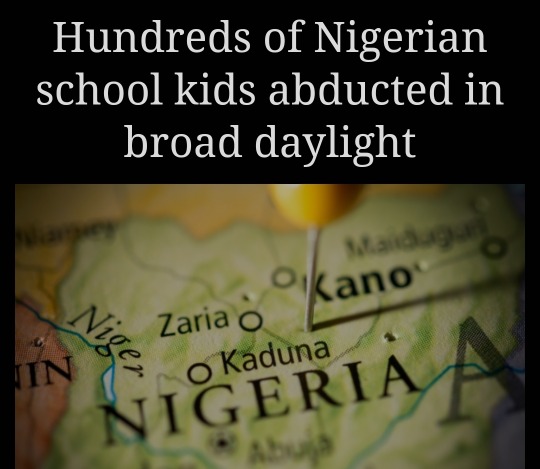
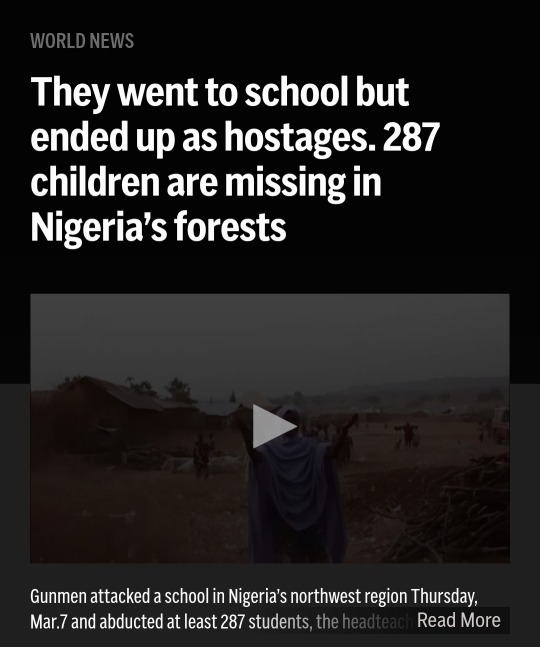
BY CHINEDU ASADU
March 8, 2024
ABUJA, Nigeria (AP) — "Security forces swept through large forests in Nigeria’s northwest region on Friday in search of nearly 300 children abducted from their school by motorcycle-riding gunmen in the latest mass kidnapping, which analysts and activists blamed on the failure of intelligence and a slow security response.
The abduction of the 287 children in Kaduna state, near the West African nation’s capital, is one of the largest school kidnappings in the decade since the kidnapping of schoolgirls in Borno state’s Chibok village in 2014 stunned the world. Analysts and activists say the security lapses that allowed that mass abduction remain.
The victims of the latest attack — among them at least 100 children aged 12 or under — were surrounded and marched into a forest just as they were starting the school day, said locals in Kuriga town, located 55 miles (89 kilometers) from the city of Kaduna. One man was shot dead as he tried to save the students, school authorities said."
J-P Mauro - published on 03/14/24
"With no word from the abductors, the bishops are calling on the state to identify the kidnappers and save the hostages.
The remote town of Kuriga, in Nigeria’s Kaduna state, is still reeling after dozens of armed extremists kidnapped hundreds of students out of their classes in broad daylight on the morning of March 7. Worried parents are now calling for government intervention, after days without any word from the abductors. As of March 13, the children have yet to be found.
The AP reports that at least 287 students were abducted – with about 100 of them aged 12 or under – making it one of the largest kidnappings since the 2014 abduction of the Chibok girls, when 275 girls were taken from their school by Boko Haram.
The parallels between the two kidnappings have created more worry for parents, as even to this day nearly 100 of the Chibok girls remain missing.
The March 7 kidnapping saw children taken from the school just as the day was starting, at around 8 a.m.. They were herded into the forest. It took authorities several hours to respond to the scene and begin a search operation, but it is unclear how deep into the forest the kidnappers went.
Locals have suggested that the abductors belong to a group of bandits who have been terrorizing remote villages in Nigeria’s northwest and central regions.
14-year-old Nigerian girl could declared a martyr. Nigeria is one of the places of most intense suffering for Christians in our day.
Bishop Wilfred Anagbe of Makurdi has called on the government to intercede on behalf of the Christian population, which he said is being targeted by these attacks. Bishop Anagbe told OSV:
“The kidnappings, killings and destroying churches we are experiencing every day are aimed at finishing Christians. We are worried that despite such killings and kidnappings, the government has never arrested anyone. As a church, we now demand that the government act quickly to stop these vices that continue to dishearten people.”
I try hard not to hate anyone, but The Meghans sure know how to push the right buttons. 🤐🤬
Safety 1st: The UK is unsafe but African countries where Nigerian schoolgirls are kidnapped & Zika Zones for childbearing royals are no problem.

Team Sussex: Global Court Jesters

#royal grifters#sussex scam#megxit#africa#african parks#scammers#nigeria#religious martyrs#christian persecution#kidnapping#nigerian girls#Nigerian Schoolchildren Kidnapped#Meghan & Harry are Frauds#Nigerian kidnappers#IPP Status#InGRIFTus#InFLICTus#racists#profit off poverty#poverty vultures#archewell is a fraud#show up do nothing#waaagh#spare us#worldwide privacy tour#misan harriman is a fraud#Sussex Global Court Jesters#poverty tourism#Bring Back Our Girls 2.0#meghan harry & misan are nigerian scammers
36 notes
·
View notes
Text
Nigeria's President Bola Tinubu has squarely rejected the idea of paying any ransom for the release of more than 280 schoolchildren who were abducted last week. Tinubu specified that "not a dime" would be spent to meet the kidnappers' demands, after the payment of ransom was made illegal in Nigeria in 2022.
Authorities may be running out of time to secure the release of the hostages in northwestern Kaduna state, as the kidnapping gangs have vowed to kill the captives if their demands are not met.
The kidnappers have asked for the equivalent of over $620,000 (about €570,000) for the release of the students and school staff — in addition to 11 Toyota Hilux pickup vehicles and 150 motorcycles.
The abductions, which took place in the town of Kuriga on March 7, are the first major kidnappings to take place in Nigeria since 2021. However, gunmen have been operating in the region for several years. Known locally as bandits, they frequently abduct individual locals, especially pupils, to demand ransom payments.
President Tinubu also stressed that the military must step in to ensure the release of the victims, according to Nigeria's Information Minister Mohammed Idris.
"The president has directed that security agencies must as a matter of urgency ensure that these children and all those who have been kidnapped are brought back to safety," Idris told reporters on Wednesday.
Kaduna Governor Uba Sani added that all authorities were "doing everything possible to ensure the safe return of the pupils and students."
Islamist militants, bandits behind kidnapping surge
This recent surge in abductions has become a growing challenge for Nigeria's embattled government. Earlier in the week, some 60 people were also abducted from another village in Kaduna state.
In the past 10 days alone, close to 400 people have been kidnapped for ransom, including 15 other students.
"We see that there are two actors [behind the kidnappings]: one are Islamist militants and then the [other are] bandit groups who have been prescribed as terrorists by the Nigerian government," security expert Ryan Cummings told DW.
Cummings, the director of Signal Risk, a security analysis organization with a focus on the African continent, added that while for the Islamists, "there are some political considerations they demand in exchange for the release of hostages, such as the release of some of their own captured militants," the local bandits operating primarily in northwestern and north-central Nigeria chiefly appear to be motivated by money and secondly by protecting their territorial interests.
"[The bandits] tend to demand financial concessions, but they also use hostages in some of their camps as the means of preventing the Nigerian military from conducting air raids on their positions, for example.
"So obviously they are using civilians as human shield," he said.
Are kidnappers 'ready for negotiation'?
Some attempts are nevertheless being made to negotiate between the government and the criminal gangs. Sheikh Ahmad Gumi, a respected Islamic cleric with a strong military background, has offered to mitigate between the two camps — but there's little hope of success.
Such an intervention, however, would be difficult as the kidnappers seem to become bolder with increasingly excessive ransom demands, said Aliyu Othman, a Nigerian media analyst and journalist.
"The issue of negotiating with bandits will in a lot of the cases not bring about peace. Sheikh Gumi has been offering that opportunity since the period of [Muhammadu] Buhari as the president of Nigeria," Othman told DW.
"Are the kidnappers, the bandits, ready for negotiation or settlement? That is what is important here."
'All we have tried so far has not worked out'
While officials remain resolute in not entering into negotiations with the kidnappers, some Nigerians believe Tinubu's government must keep an open mind in dealing with the crisis.
DW took to the streets of Abuja to ask locals their views. A female resident said she believed the government had to do more to ensure the safety of families who were exposed to the activities of bandits across the country.
"We wake up to a fresh story of a kidnappings every day, when you least expect it. And the sad thing is that now the vulnerable are the victims, like children, women and entire families," she said.
A mother from Abuja, meanwhile, responded that something needs "to be done because all we have tried so far has not worked out. All the security measures that were put in place by the government have failed."
A male resident of Abuja told DW that the government needed more resources to tackle the crisis.
"The attacks are rampant all over. […] If we begin to ask ourselves how many security personnel we have on the ground and how well have they been taken care of, we might get somewhere. So I am appealing to the government to buy the latest technology to track down these criminals because that is the only way forward," he said.
Corruption hindering efforts to fight abduction crisis
Security analyst Cummings agreed that Nigerian authorities have to step up their efforts to stop the kidnappings.
"The Nigerian government will firstly have to enhance the resources available to state security personnel and properly train specialized units that are engaged in anti-kidnapping operations. But most members of the security forces are too inadequately resourced [to begin with], they lack ammunition and food provisions and other resources, too," he said.
Cummings said that while the tools necessary to fight terrorists and kidnappers were in sore demand across the region, corruption within the security services was also contributing to the derailing of efforts to end the crisis.
"The state is not in the position to provide additional resources. This needs to change. There needs to be a shift in strategy."
7 notes
·
View notes
Text

https://www.reuters.com/world/europe/kyiv-lviv-under-russian-air-attack-poland-activates-aircraft-officials-say-2024-03-24/
4 notes
·
View notes
Text
Various armed groups have kidnapped hundreds of people, including 287 schoolchildren, across northern Nigeria in a series of alarming attacks since late February. The kidnappings are the latest indication of Nigeria’s spiraling security crisis, as communities continue to face severe threats from Islamist insurgents like Boko Haram in the country’s northeast and other criminal groups in the northwest.
On February 29, suspected Boko Haram insurgents abducted over 200 internally displaced people, many of them children, in the Ngala Local Government Area of Borno State.
Then, on March 7, criminal gangs known as “bandits” kidnapped 287 students, including many girls, at the government secondary school in Kuriga town, in northwestern Kaduna State. Two days later, bandits broke into a boarding school in Gidan Bakuso village in Sokoto State and kidnapped 15 children as they slept.
The abductions have continued. Most recently, on March 18, over 87 people were reported to have been kidnapped in Kajuru community in Kaduna State.
Mass kidnappings by insurgents and other criminal groups have been a problem across the country’s northern regions since Boko Haram abducted 276 schoolgirls from Chibok in 2014, an atrocity that garnered wide international attention.
Government security forces have said they are working to obtain the safe release of the victims but face difficulties reaching remote forest areas where they are being held. Bandits have demanded 1 billion naira (about US$600,000) as ransom for the schoolchildren kidnapped in Kaduna, but Nigeria’s President Bola Ahmed Tinubu has directed that no ransom be paid.
The Nigerian authorities should seek the safe release of those kidnapped, put in place adequate measures to prevent more kidnappings, particularly of vulnerable students, and hold perpetrators to account.
1 note
·
View note
Text
School abduction: Gumi offers to negotiate with bandits

Kaduna-based Muslim cleric, Sheikh Ahmad Gumi, has revealed his intention to dialogue with bandits who abducted about 287 schoolchildren from Kuriga Government Secondary and LEA Primary Schools in the Chikun Local Government Area of the state.
Gumi said this in a bid to facilitate the release of the abducted schoolchildren should President Bola Tinubu give him the opportunity to negotiate.
According to the prominent Islamic scholar, Tinubu must not repeat the mistake made by former President Muhammadu Buhari, who refused to dialogue with bandits.
we reports that bandits invaded the Kuriga area of the Chikun Local Government Area of Kaduna State, shooting at their victims before taking away at least 280 of the pupils and teachers from both schools.
The incident occurred barely 24 hours after insurgents abducted 200 internally displaced women in Borno State.
The women were kidnapped in Ngala, the headquarters of Gambarou Ngala in Borno State, while fetching firewood in the bush.
Penultimate Thursday, bandits invaded the Gonin-Gora in the same Chikun LGA, prompting residents to barricade the Kaduna-Abuja Expressway in protest against the abduction of an unspecified number of people in the area.
Meanwhile, the government of the affected state has refused to dialogue with the bandits to release the schoolchildren and has also refuted claims that it had hired a private negotiator to facilitate the release of the victims.
However, reacting to the development, Gumi said in a statement, “The government’s stand of no negotiation with the bandits is an unfortunate position. My advice is that the government should dialogue with the bandits not only for these Kuriga school children’s abductions but all cases.
“Also, the government should use the same approach it used in releasing passengers that were abducted on the Abuja–Kaduna train in 2022 to release the Kuriga school children and others.
“I am ready to lead a holistic dialogue between the government and bandits. It is my religious duty to do so for peace.
“I hope the present government of President Bola Ahmed Tinubu will listen by dialoguing with the bandits because the past administration of former President Muhammadu Buhari refused to do so.”
Gumi had previously negotiated on behalf of state governments to free abducted people by bandits.
In May 2021, one of the parents of the kidnapped students of the Federal College of Forestry Mechanisation, Afaka, Kaduna State, said rather than point an accusing finger at Gumi for being complicit in the banditry ravaging the country, Nigerians should commend the cleric for his interventions in seeking the release of abducted persons in the country.
Read the full article
0 notes
Photo
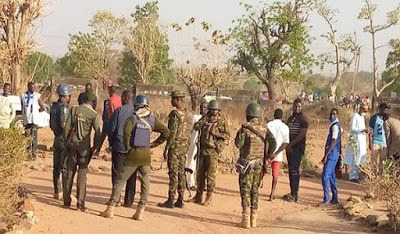
Arewa group laments escalate kidnapping of schoolchildren
https://nigerianeyez.blogspot.com/2021/02/arewa-group-laments-escalate-kidnapping.html
0 notes
Text
Boko haram timeline of kidnapping girls and boys in Nigeria.
Timeline
Here are some of the cases of mass kidnapping of schoolchildren in Nigeria in the last seven years and the events around them .
April 14, 2014: Boko Haram terrorists abducted hundreds of schoolgirls from their dormitories in Chibok, Borno State at a time the students were writing their final year exams. About 57 of the girls manage to escape at different times while on transit with their abductors.
April 16, 2014: The military said soldiers had rescued over 100 of the Chibok schoolgirls but quickly withdrew the claim after the school principal, Asabe Kwambura, and many of the parents of the abducted girls refuted it.
May 12, 2014: Boko Haram releases the first video of the abducted girls, a development which confirmed that the girls were actually in the custody of the Abubakar Shekau-led terror group. Mr Shekau in the video threatened to marry the girls off or use them as part of his war booty.
May 20, 2014: The Borno State government set up a N150 million special fund for the rehabilitation of the 57 Chibok girls who had escaped.
October 16, 2014: The former Chief of Defence Staff, Alex Badeh, an air vice-marshal, said the federal government had reached a ceasefire deal with leaders of Boko Haram and that the 216 girls in their captivity would soon be released. But Boko Haram leaders quickly denied the claim.
November 2, 2014: Boko Haram leader, Mr Shekau, released a video in which he declares that all the 216 girls in his custody had been converted to Islam and married off. He also denied ever negotiating with the federal government concerning the girls.
March 24, 2015: A woman who escaped from Boko Haram captivity said some of the Chibok girls were being held somewhere near Gwoza and that two of the girls had been killed during a military air strike on one of the terrorists’ locations.
May 29, 2015: President Muhammadu Buhari, in his inaugural speech, promised to end the Boko Haram insurgency and rescue the Chibok schoolgirls “within six months”.
August 29, 2015: President Buhari meets 90 of the parents of the abducted Chibok girls during which he restated his promise to rescue the girls.
November 30, 2015: President Buhari during a media chat said there is no “credible information” on the whereabouts of the Chibok girls, dashing hopes in their release.
May 18, 2016: One of the abducted Chibok girls, Amina Ali Nkeki, was found with her baby and a man she identified as her husband.
October 13, 2016: Boko Haram releases 21 Chibok girls following negotiations.
ADVERTISEMENT
January 5, 2017: Another Chibok girl, Rakiya Abubakar, is found with her baby, which brought to 23 the number of the abducted girls to have regained freedom.
May 2017: Another 82 girls are released in exchange for five Boko Haram commanders. Later that month, Boko Haram released a video in which a woman in a black veil claiming to be one of the Chibok girls brandishes a gun and proclaims loyalty to the group.
December 30, 2020: The Chibok community demands the release of the remaining schoolgirls in Boko Haram captivity.
February 18, 2018: Nearly 110 schoolgirls are kidnapped by Boko Haram terrorists in Dapchi town of Yobe State.
February 20, 2018: The Nigerian government confirms that 110 schoolgirls are missing.
February 21, 2018: The Yobe State government announces the rescue of some of the girls and says they are with the army.
February 22, 2018: The Yobe government retracts the statement and apologises for misleading the public, saying “No girl was rescued.”
February 23, 2018: President Buhari calls the abduction of schoolgirls in Dapchi a ‘national disaster’.
February 25, 2018: The Nigerian Air force announces the deployment of aircraft and additional personnel for search and rescue missions.
March 9, 2018: Women hold a protest in Abuja three weeks after the abduction of the Dapchi schoolgirls.
March 12, 2018: President Muhammadu Buhari announces plan to negotiate the girl’s release, rather than use military force.
March 14, 2018: Mr Buhari makes first visit to Dapchi, assuring parents of the missing schoolgirls that the government will rescue the students.
March 20, 2018: Amnesty International claims Nigerian Army ignored repeated warnings of an attack on Dapchi town, hours before the abductions.
March 21, 2018: The Nigerian government announces that 104 of the 110 schoolgirls have been freed.
December 11, 2020: Suspected gunmen attack Government Boys Science Secondary School in Kankara Local Government Area of Katsina State and abduct over 300 students.
December 16, 2020: Parents and guardians of the abducted schoolboys in Kankara said they were disappointed with President Buhari and Governor Aminu Masari, who they said had failed to ensure security in the state.
December 17, 2020: The abducted Kankara students regain freedom.
December 18, 2020: The United States (U.S.) condemns the abduction of students, urging the Nigerian government to hold kidnappers accountable.
February 17, 2021: Suspected bandits abduct 27 students and 15 others at Government Science School, Kagara in Niger State.
February 17, 2021: The federal government promises to take ‘political and military’ steps to secure the release of college students.
February 17, 2021: The Nigerian Army said its troops were in ‘hot chase’ of the bandits behind the abductions in Kagara.
February 19, 2021: The governor of Niger State said negotiation for the release of the abducted persons is at the final stage.
February 24, 2021: Kidnappers demanded ransom from victims’ parents and warn that the students may starve to death if the ransom is not paid quickly.
February 25, 2021: The governor of Niger State said the Nigerian government is not ‘helping’ in the rescue of the abducted persons.
February 26, 2021: Bandits kidnap 317 female students of Government Girls Secondary School Jangebe, Zamfara State in an early morning raid on their school.
February 26, 2021: The Zamfara State government confirms the abduction.
February 26, 2021: The police confirm that 317 schoolgirls were abducted in Jangebe.
This kidnapping of girls have being going on for years and years to come .And even if the media hasn’t put enough light on this. I remember living in the north in Nigeria. Pls send your prayers.
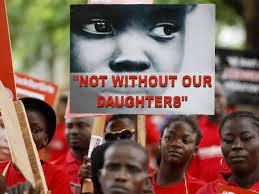
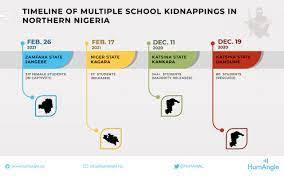
https://www.irishtimes.com/news/world/africa/beaten-with-guns-freed-nigerian-schoolgirls-recount-kidnap-ordeal-1.4498945
Pls reblog
4 notes
·
View notes
Text
Sunday, August 29, 2021
Louisiana braces for ‘life-altering’ Hurricane Ida
(AP) Residents across Louisiana’s coast Saturday were taking one last day to prepare for what is being described as a “life-altering” Hurricane Ida which is expected to bring winds as high as 140 mph (225 kph) when it slams ashore. A combination of voluntary and mandatory evacuations have been called for cities and communities across the region including New Orleans, where the mayor ordered a mandatory evacuation for areas outside the city’s levee system and a voluntary evacuation for residents inside the levee system. The storm is expected to make landfall on the exact date Hurricane Katrina devastated a large swath of the Gulf Coast 16 years earlier. But whereas Katrina was a Category 3 when it made landfall southwest of New Orleans, Ida is expected to reach an extremely dangerous Category 4 hurricane, with top winds of 140 mph (225 kph) before making landfall likely west of New Orleans late Sunday. “This will be a life-altering storm for those who aren’t prepared,” National Weather Service meteorologist Benjamin Schott said during a Friday news conference with Louisiana Gov. John Bel Edwards.
White House More Than Doubles Its Inflation Forecast in New Update
(WSJ) The White House more than doubled its forecast for annual inflation in new projections released Friday, as supply-chain disruptions stemming from the Covid-19 pandemic continue to put upward pressure on prices. The Office of Management and Budget said it expected consumer prices would rise 4.8% in the fourth quarter from a year earlier, up sharply from the 2% rise that the Biden administration forecast in May. Officials see those price pressures quickly abating next year, with the consumer-price index rising 2.5% in the fourth quarter of 2022, more than the 2.1% they expected in May, and reaching 2.3% in 2023.
Hurricane Nora on track to skirt along Mexico’s coast
(AP) Hurricane Nora formed Saturday in the eastern Pacific on a forecast track that would bring it near the Puerto Vallarta area and then head toward a close encounter with resorts at the tip of Baja California Peninsula. Nora had maximum sustained winds of 80 mph (130 kph) Saturday morning, with tropical storm force winds extending out 175 miles (280 kilometers) from the center in some places. The storm’s large wind field and heavy rains mean much of Mexico’s central and northern Pacific Coast could see floods, mudslides and perilous surf even if it misses the very heart of the hurricane.
Brazil water survey heightens alarm over extreme drought
(AP) The Brazilian scientists were skeptical. They ran different models to check calculations, but all returned the same startling result. The country with the most freshwater resources on the planet steadily lost 15% of its surface water since 1991. Gradual retreat in the Brazilian share of the Pantanal, the world’s largest tropical wetland, left water covering just one-quarter the area it did 30 years ago. And the data only went through 2020—before this year’s drought that is Brazil’s worst in nine decades. The ongoing drought has already boosted energy costs and food prices, withered crops, rendered vast swaths of forest more susceptible to wildfire and prompted specialists to warn of possible electricity shortages. President Jair Bolsonaro on Thursday said hydroelectric dam reservoirs are “at the limit of the limit.” Brazil’s energy minister Bento Albuquerque on Aug. 25 called a press conference to deny the possibility of rationing, while at the same time calling on companies and people to reduce power consumption.
UN team: Unclear if Fukushima cleanup can finish by 2051
(AP) Too little is known about melted fuel inside damaged reactors at the wrecked Fukushima nuclear power plant, even a decade after the disaster, to be able to tell if its decommissioning can be finished by 2051 as planned, a U.N. nuclear agency official said Friday. “Honestly speaking, I don’t know, and I don’t know if anybody knows,” said Christophe Xerri, head of an International Atomic Energy Agency team reviewing progress in the plant’s cleanup. A massive earthquake and a tsunami in March 2011 destroyed cooling systems at the Fukushima plant in northeastern Japan, triggering meltdowns in three reactors in the worst nuclear disaster since the 1986 Chernobyl accident. Japanese government and utility officials say they hope to finish its decommissioning within 30 years, though some experts say that’s overly optimistic, even if a full decommissioning is possible at all.
As China-Taiwan Tensions Rise, Japan Begins Preparing for Possible Conflict
(WSJ) China’s growing assertiveness toward Taiwan has triggered a public push by Japanese leaders to plan for a possible conflict. Tokyo officials, normally wary of upsetting Beijing, are speaking openly about preparing for a crisis and supporting Taiwan, a self-ruled island claimed by China, despite Japan’s pacifist constitution. Deputy Prime Minister Taro Aso said recently in a speech to supporters that Japan and the U.S. should plan together to defend the island in the event of hostilities. In its annual regional security review, Japan said there a “greater sense of crisis than ever before” regarding Taiwan, after China stepped up maneuvers by its ships and aircraft nearby. Major Japanese military drills starting in September are expected to further help Tokyo prepare for any trouble in areas including Taiwan, current and former Japanese officials say.
American forces keep up airlift under high threat warnings
(AP) American forces working under heightened security and threats of another attack pressed ahead in the closing days of the U.S.-led evacuation from Afghanistan after a devastating suicide bombing, and U.S. officials said they had killed two members of the extremist group that the United States believes responsible for it. Thursday’s bombing marked one of the most lethal attacks the country has seen. The U.S. said it was the deadliest day for American forces in Afghanistan since 2011. Around the world, newly arriving Afghan evacuees, many clutching babies and bare handfuls of belongings in plastic bags, stepped off evacuation flights in the United States, in Albania, in Belgium and beyond. More than 110,000 people have been safely evacuated through the Kabul airport, according to the U.S., but thousands more are struggling to leave.
U.S. military begins withdrawal from Kabul airport
(Reuters) U.S. troops have begun their withdrawal from Kabul airport, the Pentagon said on Saturday, as the evacuation efforts from the Afghan capital entered their final stages. President Joe Biden sent thousands of troops to the airport as the Taliban swept through Afghanistan earlier this month to help evacuate American citizens, at-risk Afghans and other foreigners desperate to flee. At the peak of the deployment there were 5,800 U.S. troops securing Hamid Karzai International Airport, where an unprecedented airlift operation is set to end by Tuesday.
From garbage to garden, Nairobi resident helps slum bloom
(Reuters) A decade ago, a patch of land in Nairobi’s Dandora district was a dumping ground for the trash of the city’s wealthier residents with scarcely a plant to be seen. Now, children play on the grass and locals relax among avocado trees as birds sing in the branches above. The lush community garden has even become the backdrop for rappers and other creatives to shoot their videos. This transformation is thanks to Charles Gachanga, 45, who grew up in the neighbourhood back when it reeked of garbage. “We came and cleaned ... We did not even have a penny,” said Gachanga, who started working in 2013 on the garden space, called Mustard Seed, with three friends. “We just had that focus, we had that passion to see how we could transform our neighbourhood.” Their project has inspired a network of similar community-built green spaces, 20 alone in Dandora, he said. Maintenance costs are covered by community contributions. Residents living near Gachanga’s green space pay 100 shillings a month, less than $1, for maintenance. People without the funds often volunteer, planting trees or cleaning, Gachanga said.
15 more students freed in Nigeria after release of 90 others
(AP) Overjoyed parents awaited the return of 90 young schoolchildren who had spent three months held by gunmen as authorities elsewhere in northern Nigeria announced a second group of 15 students also had been released. The news was celebrated across Nigeria, where more than 1,000 students have been kidnapped from schools since December. The abductions have stepped up pressure on the Nigerian government to do more to secure educational facilities in remote areas.
How water shortages are brewing wars
(BBC Future) As much as a quarter of the world's population now faces severe water scarcity at least one month out of the year and it is leading many to seek a more secure life in other countries. "If there is no water, people will start to move," says Kitty van der Heijden, chief of international cooperation at the Netherlands' foreign ministry and an expert in hydropolitics. Water scarcity affects roughly 40% of the world's population and, according to predictions by the United Nations and the World Bank, drought could put up to 700 million people at risk of displacement by 2030. People like van der Heijden are concerned about what that could lead to. "If there is no water, politicians are going to try and get their hands on it and they might start to fight over it," she says. Over the course of the 20th Century, global water use grew at more than twice the rate of population increase. Today, this dissonance is leading many cities—from Rome to Cape Town, Chennai to Lima—to ration water. Water crises have been ranked in the top five of the World Economic Forum's Global Risks by Impact list nearly every year since 2012. In 2017, severe droughts contributed to the worst humanitarian crisis since World War Two, when 20 million people across Africa and the Middle East were forced to leave their homes due to the accompanying food shortages and conflicts that erupted. Peter Gleick, head of the Oakland-based Pacific Institute, has spent the last three decades studying the link between water scarcity, conflict and migration and believes that water conflict is on the rise. "With very rare exceptions, no one dies of literal thirst," he says. "But more and more people are dying from contaminated water or conflicts over access to water."
The year of COVID burnout
(The Week) “September was supposed to mark the beginning of a new normal,” said Katherine Bindley at The Wall Street Journal. Instead, for many workers, the spread of the Delta variant is déjà vu all over again. Companies of all sizes are delaying plans to return to the office, and outbreaks have already forced some schools to shut down. It’s left many workers “in an anxiety-producing state of limbo.” As the pandemic drags on, more people are struggling with exhaustion, loss, and isolation, and “employees’ mental health is quickly becoming a top concern,” said Erica Pandey at Axios. In addition to seeing more employees quit, “a whopping 52 percent of U.S. employers say they are ‘experiencing significant workplace issues’ with substance misuse or addiction by employees,” according to a new survey. Forty-four percent of workers now say they feel fatigued on the job, up from 34 percent in 2020. Some companies are going to great lengths to boost worker morale, said Jenny Gross at The New York Times. LinkedIn, Bumble, and Intuit recently “introduced weeklong companywide shutdowns so employees can fully disconnect.” PricewaterhouseCoopers is even “offering workers $250 each time they take 40 consecutive hours off.” Recognizing that extended vacations might not benefit workers hesitant about travel, Adobe began giving the entire company a day off one Friday per month. Before the pandemic, “I had a solid division between my work and home life,” said Cody Barbo at Fast Company. “Now everything has sort of blended together.” My company has added a monthly flex day that employees can take off for their “mental health.” We’ve also added guest speakers, virtual happy hours, and stipends for work-from-home costs.
1 note
·
View note
Text
1 note
·
View note
Text
Worry over mass abductions as schools resume today
Worry over mass abductions as schools resume today
[FILES] Schoolchildren kidnapped from an Islamic seminary three months ago walk from a van as they are reunited with their parents in Minna on August 27, 2021 after their gunmen captors freed them from forest hideouts. The May 30, 2021 Tegina seminary abduction in northwest Niger State was one of the longest-running mass kidnappings at a Nigerian school since December when criminal gangs began to…
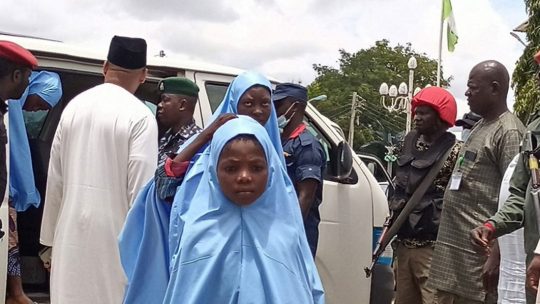
View On WordPress
0 notes
Text
School abduction: Gumi offers to negotiate with bandits

Kaduna-based Muslim cleric, Sheikh Ahmad Gumi, has revealed his intention to dialogue with bandits who abducted about 287 schoolchildren from Kuriga Government Secondary and LEA Primary Schools in the Chikun Local Government Area of the state.
Gumi said this in a bid to facilitate the release of the abducted schoolchildren should President Bola Tinubu give him the opportunity to negotiate.
According to the prominent Islamic scholar, Tinubu must not repeat the mistake made by former President Muhammadu Buhari, who refused to dialogue with bandits.
we reports that bandits invaded the Kuriga area of the Chikun Local Government Area of Kaduna State, shooting at their victims before taking away at least 280 of the pupils and teachers from both schools.
The incident occurred barely 24 hours after insurgents abducted 200 internally displaced women in Borno State.
The women were kidnapped in Ngala, the headquarters of Gambarou Ngala in Borno State, while fetching firewood in the bush.
Penultimate Thursday, bandits invaded the Gonin-Gora in the same Chikun LGA, prompting residents to barricade the Kaduna-Abuja Expressway in protest against the abduction of an unspecified number of people in the area.
Meanwhile, the government of the affected state has refused to dialogue with the bandits to release the schoolchildren and has also refuted claims that it had hired a private negotiator to facilitate the release of the victims.
However, reacting to the development, Gumi said in a statement, “The government’s stand of no negotiation with the bandits is an unfortunate position. My advice is that the government should dialogue with the bandits not only for these Kuriga school children’s abductions but all cases.
“Also, the government should use the same approach it used in releasing passengers that were abducted on the Abuja–Kaduna train in 2022 to release the Kuriga school children and others.
“I am ready to lead a holistic dialogue between the government and bandits. It is my religious duty to do so for peace.
“I hope the present government of President Bola Ahmed Tinubu will listen by dialoguing with the bandits because the past administration of former President Muhammadu Buhari refused to do so.”
Gumi had previously negotiated on behalf of state governments to free abducted people by bandits.
In May 2021, one of the parents of the kidnapped students of the Federal College of Forestry Mechanisation, Afaka, Kaduna State, said rather than point an accusing finger at Gumi for being complicit in the banditry ravaging the country, Nigerians should commend the cleric for his interventions in seeking the release of abducted persons in the country.
Read the full article
0 notes
Text
Pray for children in bandits' hands - Shehu Sani urges Nigerians
Pray for children in bandits’ hands – Shehu Sani urges Nigerians
Senator Shehu Sani, who represented Kaduna Central at the 8th National Assembly, has called on Nigerians to remember the abducted schoolchildren.
DAILY POST recalls that armed men, suspected to be bandits, raided some schools in the North, particularly Kaduna State, where over hundreds of students were kidnapped.
Reacting to the developments, the former lawmaker expressed disappointment in the…

View On WordPress
0 notes
Text
Boko Haram Targets Female schoolchildren, Women As The Army Captures terrorists with sex enhancement drugs
Boko Haram Targets Female schoolchildren, Women As The Army Captures terrorists with sex enhancement drugs
NEWSMEDIANG.COM
Boko Haram insurgents.
The Nigerian Army says it has captured Boko Haram terrorists with sex enhancement drugs and other “assorted items” in a clearance operation in Borno.
Boko Haram terrorists have often targeted female schoolchildren and women in attacks, kidnapping them and turning them either into sex slaves or ‘wives.’ In the past, the extremist group had used underage…
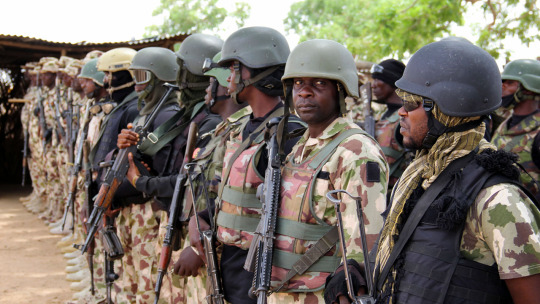
View On WordPress
0 notes
Text
About 140 students missing and presumed kidnapped after gunmen storm another school in northwest Nigeria #SootinClaimon.Com
#SootinClaimon.Com : ขอบคุณแหล่งข้อมูล : หนังสือพิมพ์ The Nation.
https://www.nationthailand.com/international/40002864
About 140 students missing and presumed kidnapped after gunmen storm another school in northwest Nigeria
At least 140 Nigerian schoolchildren are missing after gunmen stormed a school Monday in Nigerias northwest Kaduna state, where an epidemic of kidnappings for ransom has…
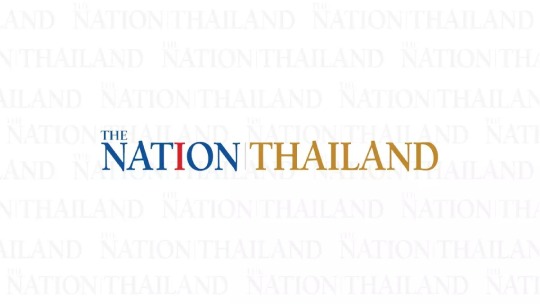
View On WordPress
0 notes
Photo

Reno Omokri wrote; Why would a Northern group place a ₦100 million bounty on Nnamdi Kanu’s head? The North has bandits who abduct schoolchildren on an almost weekly basis. They also have Boko Haram. Killer herdsmen are on the cusp of causing Nigeria’s worst famine because farmers are unable to farm for fear of being slaughtered by herdsmen, many of whom are not even Nigerians. You can’t travel safely in the North because kidnappers are on the prowl. They even kidnap soldiers and policemen, so who do you report to? These Northern groups should use their ₦100 million to place a bounty on the heads of leaders of bandits, killer herdsmen, kidnappers and Boko Haram. How can you be experiencing migraine headache, and offer your paracetamol to your neighbour who has an ordinary headache? #TableShaker #NewsieEventsVibes https://www.instagram.com/p/CQRY2tpn1qx/?utm_medium=tumblr
0 notes
Text
Thursday, March 18, 2021
Battling bigness: Congress eyes action against monopolies
(AP) The battle against bigness is building. Whether it’s beer, banks or book publishing, lawmakers are targeting major industries they say have become so concentrated that they’re hurting competition, consumers and the economy. The economic dislocation of the pandemic has laid bare the struggles of small businesses unable to compete with corporate giants that have been able to capitalize on the new order. Experts and lawmakers are throwing out stunning stats: The four biggest airlines control about 65% of U.S. passenger traffic, five giant healthcare insurers control an estimated 45% of the market, pharmaceuticals are dominated by three major companies, the top four banks control about 44% of the market, the so-called Big Five book publishers control some 80% of the U.S. book market, and Google alone accounts for about 90% of web searches worldwide. Beer and a burger? Four companies are estimated to control 80% of U.S. meat-packing; the top four brewers and importers control about 76% of the U.S. beer market. Critics say the corporate concentration is quickening, limiting consumers’ choices, raising prices and eroding service.
Bloodshed in Atlanta
(Reuters) Eight people, six of them women of Asian descent, were shot dead in a string of attacks on Atlanta-area day spas on Tuesday, and a man suspected of carrying out all of the shootings was arrested hours later in southern Georgia. The violence unfolded days after U.S. President Joe Biden used a nationally televised speech to condemn a recent surge in hate crimes and discrimination against Asian-Americans.
On Mexico’s Border With U.S., Desperation as Migrant Traffic Piles Up
(NYT) The migrants’ hopes have been drummed up by human smugglers who promise that President Biden’s administration will welcome them. Instead, the United States is expelling them back to Mexico, where they wait along with tens of thousands of others hoping to cross. The pressure, and desperation, is quickly building among families stuck in Mexico, as shelters and officials struggle to help them. Shelters that were empty four months ago are now having to turn many away.
Chinese fishing fleets are sweeping South American oceans dry
(Clarin/Argentina) A new Greenpeace report warns that foreign fishing fleets, mostly from China, are gobbling up every bit of marine life they can into “stadium-sized” nets in Argentina’s sea waters, writes Natasha Niebieskikwiat in Buenos Aires-based daily Clarin. The environmental group Greenpeace recently counted at least 470 boats in a biodiversity hotspot known as “Agujero Azul” or the “Blue Hole,” off the Patagonian coast between Chubut and Santa Cruz. Luisina Vueso, who worked on the report, told Clarín that usually, Argentine coastal waters have 270 boats concentrated in an area of roughly 1 million square kilometers. Right now there are 470 boats extracting stock like squid and other species in barely 5,000 square kilometers. Greenpeace warns that there are no checks on this type of fishing, which sweeps up marine life with underwater nets almost the size of football pitches. These reach the seabed and pick up all there is, regardless of numbers, endangered status or usefulness. Greenpeace concluded in 2019 that years of exploitation had devastated the seabed off the Argentine coast.
Boris Johnson’s vision for post-Brexit ‘Global Britain’ includes more nuclear weapons
(NYT) In a declaration of its aspiration to become “Global Britain,” Prime Minister Boris Johnson on Tuesday unveiled his government’s 10-year plan to boost international trade and deploy soft power around the world. But Johnson’s government surprised many by declaring it would also increase its arsenal of nuclear warheads, not only to deter traditional threats but also to confront biological, chemical and perhaps even cyber assaults. In the sweeping review of its priorities for the coming decade, the 110-page document titled “Global Britain in a competitive age” declared that the U.K. would raise the cap on the number of nuclear warheads aboard the Royal Navy’s Trident submarines—from 180 to 260, an increase of more than 40 percent. The document also vowed to maintain a fleet of four nuclear-armed subs, so it would always have one at sea, ready to respond. The new goal appears to mark a profound shift away from Britain’s long commitment to nonproliferation. For decades now, Britain seemed content to reduce its aging nuclear arsenal, not bolster it.
Turkey: Getting away with murder
(NYT) Turkish men get away with murder—literally. Since 2002, when President Recep Tayyip Erdogan and his Islamist Justice and Development Party took office, instances of domestic violence and femicide have soared, and the men responsible continue to go unpunished. Murders of women rose from 66 in 2002 to 953 in the first seven months of 2009, after which the government stopped releasing the data. Turkey’s interior minister said 266 women died from domestic violence in 2020, but women’s rights groups say the number is much higher. They cite their own figures of 370 recorded femicides and 171 cases of women dying under suspicious circumstances. Add to that women’s suicides, which get only cursory investigation. “In Turkey, at least three women are being killed every day,” said an activist and women’s issues commentator. She noted that femicide is becoming more violent, and some of the brutality is tantamount to systematic torture.
Deadly violence resumes in Myanmar after peaceful protests
(AP) At least two people protesting last month’s military coup were reported shot and killed by Myanmar security forces Tuesday after a morning of peaceful marches. Security forces have killed scores of their countrymen in recent days, and the U.N. has put the death toll at 149 since the Feb. 1 coup that toppled Aung San Suu Kyi’s elected government. Violence was reported Tuesday in the biggest city, Yangon, where casualties have been the highest. Police fired rubber bullets in several neighborhoods, and one man was reported killed. Another killing was reported in Kawlin city in the northwestern Sagaing Region.
‘We are hungry’: Lebanese protest worsening economic crisis
(AP) Outraged protesters returned to the streets of Lebanon’s capital Tuesday, blocking roads with burning tires and garbage containers as the currency continued to plummet to all-time lows and the country’s financial crisis intensified. The protests resumed—although in smaller numbers—following several days of relative calm as the Lebanese pound continued its slide, plunging to a new low of 15,000 to the U.S. dollar on the black market. The currency has lost 90% of its value since October 2019, when anti-government protests erupted, including more than 25% in the past few weeks alone. Inflation and prices of basic goods have skyrocketed in the country, which imports more than 80% of its basic goods. Senior politicians, meanwhile, have refused to work together to form a new government that would implement the reforms needed to extract the nation from the crisis. The currency crash has pushed more than half the population into poverty. It has also depleted foreign reserves, raising concerns that Lebanon’s central bank will not be able to finance subsidies of some basic commodities, including fuel in coming weeks.
Gunmen on motorcycles kill at least 58 in Niger
(AP) Gunmen on motorcycles attacked a group of civilians returning from market day in a volatile corner of Niger, leaving at least 58 people dead and then burning granaries to the ground, the government said Tuesday. There was no immediate claim of responsibility for Monday’s massacres, though extremists belonging to the Islamic State in the Greater Sahara group are known to be active in the Tillaberi region where the villages were attacked.
Nigeria: Inflation hits four-year peak as food prices soar
(Al Jazeera) Nigerian inflation hit a four-year peak in February as food prices jumped more than 20 percent, heaping financial pressure on households already faced with a shrinking labour market and a stagnant economy at a time of mounting insecurity. Inflation, in double digits since 2016, reached 17.33 percent, driven by the impact of a coronavirus epidemic that has also induced a drop in the price of oil, Nigeria’s main export, and weakened the naira currency. Food prices, which make up the bulk of the inflation basket, rose 21.79 percent in February, a jump of 1.22 percentage point in January, the National Bureau of Statistics (NBS) said. In a country plagued by insecurity following a wave of kidnappings of schoolchildren in its increasingly lawless north, there are concerns that the “stagflation” combination of rising unemployment and prices and low growth could trigger significant social unrest.
1 note
·
View note